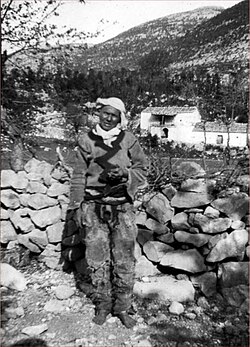
Back বলকান শপত গ্ৰহণ কৰা কুমাৰী Assamese Клятвенная нявінніца Byelorussian Прысяжная цнатлівіца BE-X-OLD Verge jurada Catalan Panna z přísahy Czech Eingeschworene Jungfrau German Ορκισμένες παρθένες Greek Virgen juramentada Spanish Albaania vannutatud neitsid Estonian باکرههای سوگندخورده بالکان Persian

Balkan sworn virgins (in Albanian: burrnesha; in Bosnian: tobelija) are a traditional gender variant or third gender social role in certain Balkan cultures,[1] consisting of people who are assigned female at birth but take a vow of chastity and live the rest of their lives socially recognized as men. The practice is most common in patriarchal northern Albania, Kosovo and Montenegro, where burrnesha are recognized under the tribal Kanun law, but also exists, or has existed, to a lesser extent in other parts of the western Balkans, including Bosnia, Dalmatia (Croatia), Serbia and North Macedonia.[2]
In times when women had a prescribed role, burrnesha gave up their preexisting sexual, reproductive and social identities to acquire the same freedoms as men. They could dress as men, be head of the household, move freely in social situations, and take work traditionally open only to men.[3] National Geographic's Taboo estimated in 2002 that there were fewer than 102 Albanian sworn virgins left.[4] As of 2022[update], while there were no exact figures, twelve burrnesha were estimated to remain in Northern Albania and Kosovo.[3]
| History of Albania |
|---|
 |
| Timeline |
- ^ Littlewood, Roland. “Three into Two: The Third Sex in Northern Albania.” Anthropology & Medicine, vol. 9, no. 1, Apr. 2002, pp. 37–50. EBSCOhost
- ^ "Stana Cerović, poslednja crnogorska virdžina" [Stana Cerović, the last Montenegrin virgin] (in Serbian). National Geographic Serbia. 28 June 2016. Archived from the original on 30 June 2016.
- ^ a b McLean, Tui (10 December 2022). "The last of Albania's 'sworn virgins'". BBC News.
- ^ "National Geographic's Taboo". natgeo.com. Archived from the original on 2010-01-17. Retrieved 2009-11-11. (trailer: "Taboo S1E9: Sexuality (Documentary)" (video 1h 36'). National Geographic – via YouTube.)